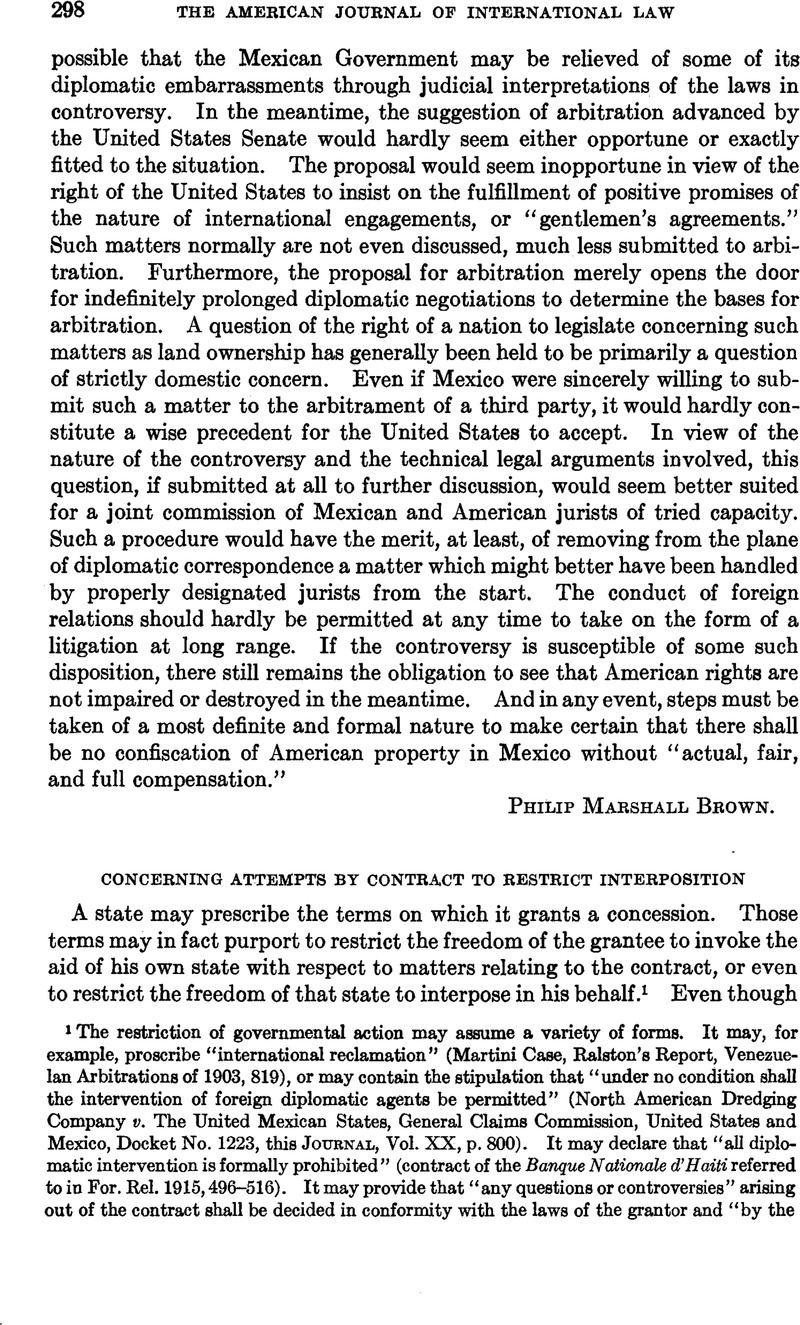No CrossRef data available.
Published online by Cambridge University Press: 06 June 2017

1 The restriction of governmental action may assume a variety of forms.It may, forexample, proscribe “international reclamation” (Martini Case, Ralston Report, Venezuelan Arbitrations of 1903, 819), or may contain the stipulation that “under no condition shall the intervention of foreign diplomatic agents be permitted” (North American Dredging Company v. The United Mexican States, General Claims Commission, United States and Mexico, Docket No. 1223, this Journal, Vol. XX, p. 800). It may declare that “ all diplomatic intervention is formally prohibited” (contract of the Banque Nationale Haiti referred to in For. Rel. 1915,496-516). It may provide that “any questions or controversies” arising out of the contract shall be decided in conformity with the laws of the grantor and “ by the competent tribunals of the Republic”(Turnbull Case, Ralston' Report, Venezuelan Arbitrations of 1903, 200).
2 It is believed that the damages should be assessed on a delictual rather than a contractual basis.
3 Declared Mr. Bayard, Secretary of State, to Mr. Buck, Minister to Peru, February 15, 1888: “ This government can not admit that its citizens can, merely by making contracts with foreign powers, or by other methods not amounting to an act of expatriation or a deliberate abandonment of Ame can citizenship, destroy their dependence upon it or its obligations to protect them in case of a denial of jus ice.” (MS. Inst. Peru, XVII, 323, Moore, Digest, VI, 294.)
See also Mr. Bayard, Secretary of State, to Mr. Hall, Minister to Central America,March 27, 1888, For. Rel. 1888, I, 134-137, Moore, Digest, VI, 295; same to Mr. Straus, Minister to Turkey, No. 115, June 28,1888, For. Rel. 1888, II, 1599, Moore, Digest, VI, 296. See also Aide-memoire, handed by the American Ambassador to the Mexican Minister for Foreign Affairs by instruction from the Secretary of State on November 27, 1925, Senate Doc. No. 96, 69th Cong., 1 Sess., pp. 5, 6.
4 North American Dredging Company v. The United Mexican States, General Claims Commission, United States and Mexico, Docket No. 1223, this Journal, Vol. XX, 800
5 “ Under the rules of international law the claimant (as well as the Government of Mexico) was without power to agree, and did not in fact agree, that the claimant would not request the Government of the United States, of which it was a citizen, to intervene in its behalf in the event of internationally illegal acts done to the claimant by the Mexican authorities.” (North American Dredging Company v. The United Mexican States, General Claims Commission, United States and Mexico, Docket No. 1223, this Journal, Vol. XX, 800, 808-809. See also concurring opinion of Parker, Commissioner, Id., 810.)
6 Whether the restrictive provisions of a particular contract serve toimpair the right of the state of the grantee must depend upon all the surrounding circumstances. officers of foreign offices are aware of the great difficulty in determining even in the most judicial spirit whether those circumstances establish such an impairment. The frequency and extent of the difficulty suffice at the present time to raise doubt as to the wisdom of attempting to gain recognition of a fresh rule imposing greater restrictions upon claimant states than are now acknowledged to exist.
7 The writer has been encouraged by his colleague, Mr. Philip C. Jessup, to emphasize this distinction.